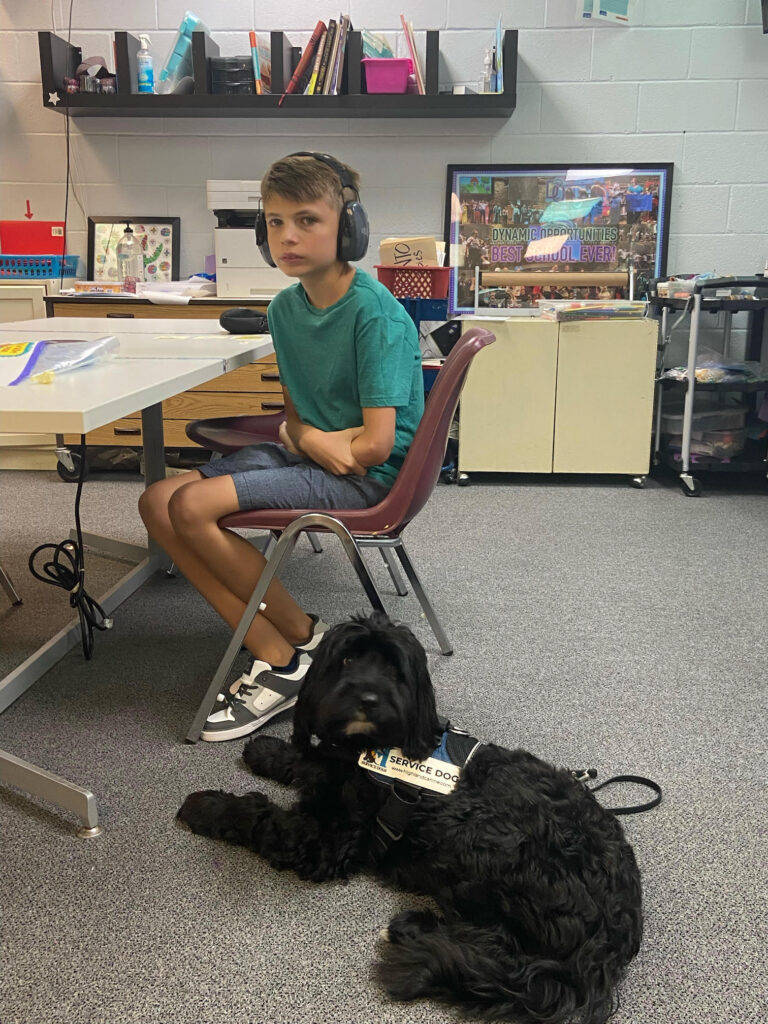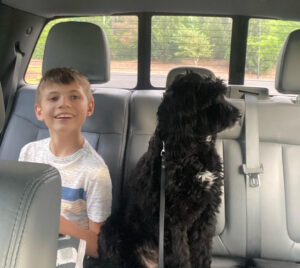The Devlin Family was one of Pawtism’s very first grant recipients, and they have a wonderful story to share. Asher, now 12 years old, has always experienced difficulties communicating that have led to intense feelings of loneliness and isolation, as well as frustration and meltdowns. He communicates to a limited degree by typing on an iPad or choosing multiple choice answers on a touchscreen and has difficulty completing seemingly simple tasks like brushing his teeth, bathing, or holding a pencil, despite having good understanding and the motivation to do these things. In his own (typed) words, “I live in a prison of my own body”.
According to his mom, Laurie, “since Asher can’t speak yet, it has been difficult for him to make friends. He was lonely and we felt a canine companion would help fill that hole as well as provide an opportunity for him to engage with other kids. Because of his situation we knew the dog would have to be calm in any kind of environment and responsive to commands. It was during the stress of 2020 that Asher began repetitively scratching his hand to cope with the anxiety, and we learned that service dogs could be trained to interrupt that type of behavior.”


Enter Maxi. The Devlins found what they believed to be the perfect dog for Asher — an Australian Labradoodle which he named Maxi — and at the same time they were learning more about autism service dogs and what they can be trained to do. Maxi was accepted into a service dog training program after several months of Asher (and the whole family) bonding with her. “For us, the most challenging part of the process was dropping off Maxi at Highland Canine Training after she had already lived with us for 3 months. When I dropped off my two older boys at college I shed a few bittersweet tears. After dropping off Maxi I ugly cried for the entire two hour drive back home.” While it was difficult for Asher and his family to be apart from her during the 9 month training program, the payoff has been huge. In the past, certain environments and situations easily overloaded Asher’s senses and caused anxiety, which frequently led to meltdowns. But now, “when we go out with her she is calm and obedient so I can focus on Asher, and because she is so calm she helps keep Asher calm. There have been lots more laughter and smiles with Maxi around! Asher loves to play catch so they are learning how to play together, and Maxi always keeps an eye on him. ‘Cuddle’ is the command for Maxi to sit close to Asher, and just the simple presence of her next to him seems to calm him. He rarely does the repetitive skin scratching anymore because he’s just more relaxed when she’s around.”
On the process of obtaining a service dog, Laurie shared that one of the greatest barriers was financial. “We never thought getting a service dog was an option because of the cost. We did some family fundraising and saved, but Pawtism was a huge blessing. The grant made what we thought would be impossible, possible. It also made us feel seen and understood. ‘It takes a village’ is often said about raising kids, but nobody actually needs that help more than families with a child on the spectrum. Unfortunately, it’s often those very families who find themselves isolated and with little support. So thank you Pawtism for being part of our village!”
To those who may not know someone with autism, or who may not be familiar with autism assistance dogs, Laurie’s words are illuminating and impactful. “I know that when I catch people looking at Asher and Maxi I feel sad that so many people miss out on discovering what an amazing, intelligent, and funny person Asher is because he’s generally misunderstood. His behaviors and inability to communicate easily or verbally have made people uncomfortable and it takes time to unwrap all the layers of Asher and see what’s underneath. Generally people seem to think that service dogs are just for those with more ‘visible’ challenges like mobility or visual impairments. I’d like more people to understand that everyone on the spectrum has different challenges and different needs, and their service dogs are perfectly paired for them specifically. The help they provide isn’t always going to be evident or visible to the casual observer, but the difference a service dog can provide for individuals and their families is real.”
